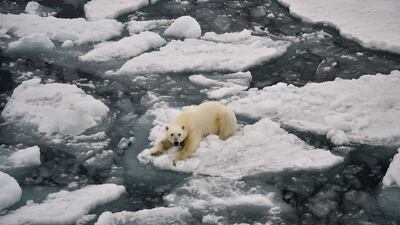Global warming is causing widespread damage to natural habitats, lives and livelihoods and some of its impacts may be irreversible, according to a sobering report from the UN's climate change body.
The Intergovernmental Panel on Climate Change (IPCC) has issued a “dire warning” over the effects of climate change in its assessment published on Monday, underlining the scale of the threat to humanity.
The report claims that further delays to curb greenhouse gas emissions and adapt to climate change mean humanity will miss “a brief and rapidly closing window of opportunity to secure a liveable and sustainable future for all".
Overall, the IPCC warns global warming is outpacing our preparations for the changes in train. “At current rates of adaptation planning and implementation, the adaptation gap will continue to grow,” it said.
Under what it called a “high vulnerability-high warming scenario”, it estimated that up to 183 million additional people would become undernourished in low-income countries due to climate change by 2050.
“Economic damages from climate change have been detected in climate-exposed sectors, with regional effects to agriculture, forestry, fishery, energy and tourism and through outdoor labour productivity,” the report summary said.
“Individual livelihoods have been affected through changes in agricultural productivity, impacts on human health and food security, destruction of homes and infrastructure, and loss of property and income, with adverse effects on gender and social equity,” it added.

UN Secretary-General Antonio Guterres described the report as “an atlas of human suffering and a damning indictment of failed climate leadership”, warning that nearly half of humanity is in the climate danger zone and many ecosystems are at the point of no return.
Some dire impacts are already irreversible, such as the likely demise of nearly all shallow water corals.
Others points of no return lie just beyond the Paris Agreement's aspirational target of capping global warming at 1.5°C above preindustrial levels, the report warned.
Even in optimistic scenarios of rapid reductions in carbon pollution, projections of climate impacts are sobering.
Up to 14 per cent of land species face a “very high” risk of extinction with only 1.5°C of warming, the IPCC said, bolstering calls for conservation of 30 to 50 per cent of the world's land and ocean territory. The threat grows with every fraction of a degree.
By 2050 there will be more than a billion people in coastal areas highly vulnerable to storm surges amplified by rising seas.
The IPCC assessment highlights the need to cope with unavoidable climate impacts on almost every page.
The report also spotlights irreversible and potentially catastrophic changes in the climate system known as tipping points, triggered at different thresholds of global heating.
These include the melting of ice sheets on the top of Greenland and the West Antarctic with enough frozen water to lift oceans 13 metres; the morphing of the Amazon basin from tropical forest to savannah; and the disruption of global ocean currents that distribute heat across the globe.
“The cumulative scientific evidence is unequivocal: Climate change is a threat to human well-being and planetary health,” the report concludes.


